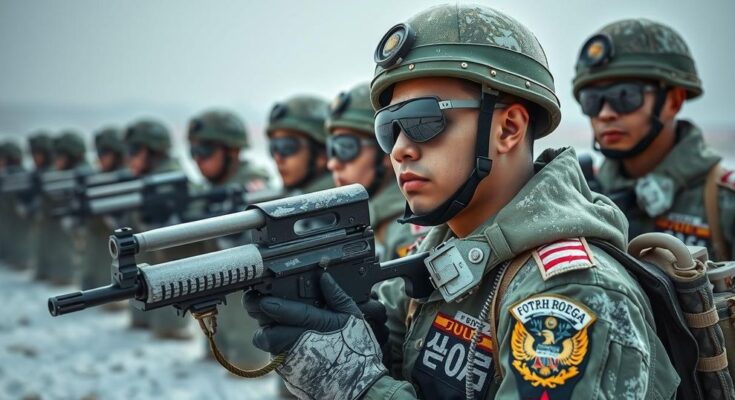The article explores the experiences of former North Korean soldiers regarding their compatriots deployed in the Ukraine conflict alongside Russian forces. Haneul recounts the extreme conditions faced in military service, including malnutrition and harsh training. Current intelligence suggests that North Korea has sent around 11,000 troops, primarily from elite units. Experts caution against underestimating these forces, noting their training and indoctrination, although challenges remain regarding communication and the potential for defection.
Haneul, a former North Korean soldier, recalls his military experience, marked predominantly by extreme hunger and malnutrition, which saw him lose significant weight during his service. His battalion, underfed, was often dispatched to guard the border with South Korea, where food was scarce. Despite being labeled among the best-fed, Haneul eventually defected in 2012, seeking a life beyond stringent military conditions.
Currently, there are reports that North Korea has dispatched approximately 11,000 troops to support Russian forces in the ongoing conflict in Ukraine, specifically to reclaim portions of the Kursk region. Recent intelligence from Seoul, Washington, and Kyiv indicates a substantial number of these troops have already engaged in combat, with reports of casualties, although confirmation remains elusive. Experts assert that these troops should not be underestimated, as many belong to the elite Storm Corps, suggesting they possess higher morale despite a lack of comprehensive training in modern warfare.
Defector Lee Hyun Seung, once an instructor for North Korea’s special forces, described the soldiers as physically selected for their stature but still largely undernourished. Online footage portrays these soldiers as frail, contrasting sharply with the propaganda depicting robust and powerful warriors.
Former soldiers attest to their demanding training regimen, underscoring the harsh conditions prevalent within the military ranks. According to Ryu Seonghyun, a defector from the air force, initial years in service can be incredibly grueling. As they adapt to combat in unfamiliar terrains, such as those in Kursk, their mission will focus on infiltration and chaos creation behind enemy lines, necessitating adaptability and resilience.
While the language barrier may complicate operations, resulting in miscommunication incidents between North Korean and Russian troops, the loyal dedication of these soldiers is deemed significant. Haneul highlights that many soldiers hailing from rural backgrounds exhibit unwavering obedience to the regime, instilled through intensive propaganda sessions.
Despite the lack of direct choice in their deployment, it is believed that some soldiers view their participation as a career advancement opportunity. The willingness to serve overseas reflects a stark juxtaposition to their strenuous life in North Korea.
Experts, including Chun In-bum, a former commander of South Korea’s special forces, stress the importance of not underestimating the soldiers merely due to their deprivation. Although the 11,000 troops may not alter the conflict dynamics drastically, further deployments could enhance their effectiveness. Importantly, Kim Jong Un’s regime can absorb casualties without destabilizing power structures, prioritizing the sending of expendable troops to uphold North Korea’s military image.
The possibility of defections among these soldiers remains limited due to deeply ingrained societal norms surrounding honor and loyalty. Psychological operations by Ukraine and South Korea face challenges, as soldiers are unlikely to have access to clandestine communication measures. Haneul expresses hope that these individuals return safely, indicating the complex emotions surrounding the conflict and the reality of the soldiers stationed in Russia.
Overall, while there may be inherent risks involved for these North Korean troops in the broader context of the ongoing war, their historical obedience and desire for advancement pose unique factors that may influence their actions on the battlefield.
The article discusses the experiences of former North Korean soldiers and their insights regarding the North Korean troops currently deployed to assist Russia in the Ukraine conflict. Haneul and other defectors reveal the dire conditions faced by these soldiers, characterized by insufficient food and harsh training regimes. With ongoing military developments, particularly the dispatch of approximately 11,000 North Korean troops, experts evaluate their combat readiness, morale, and implications for the conflict. The analysis further contemplates the regime’s ability to absorb losses and maintain control within its ranks despite potential challenges to defection and effectiveness in the field.
In conclusion, the involvement of North Korean troops in the Russian-Ukrainian conflict unveils layered complexities regarding military loyalty, conditioning, and adaptability. While many of these soldiers come from challenging backgrounds with rigorous training, their potential effectiveness and resilience cannot be dismissed. Historical perspectives on their obedience, coupled with the strategic deployment choices made by Kim Jong Un, offer critical insights into how this new military engagement may unfold in the ongoing war.
Original Source: www.bbc.com




